8 Best Note-Taking Apps for Android You Should Use in 2026
Aug 29, 2025
Taking notes on your phone has become a daily habit for many of us, whether it’s jotting down ideas, saving a shopping list, or keeping track of meeting points. With so many apps available on Android, choosing the right one can feel overwhelming. The best note-taking apps make the process easy, fast, and organized, so you never lose an important thought again.
In this article, we’ll look at the best note-taking apps for Android, highlight their key features, and help you decide which one fits your needs.
8 Best Note Taking App for Android of 2026
With so many note-taking apps available on Android, finding the best AI note-taking app for Android can feel like a jungle trek. Some apps are simple sticky-note tools, while others are powerful organizers with databases, AI helpers, and cross-device sync. Whether you're jotting down quick reminders or building a second brain, this guide cuts through the noise and highlights the best choices for 2026, based on ease of use, standout features, and value for the price.
We’ve picked the best note-taking apps for Android, ranging from fully free to premium planners, each designed for different users, from students and busy professionals to power organizers. In the table below, you’ll find the app name, what it’s best for, pricing, and its Play Store rating, all at a glance, so you can easily compare and choose what fits you best.
App Name | Best For | Pricing | Play Store Ratings |
|---|---|---|---|
Audionotes | AI voice-based transcription | Personal: $70/year; Pro: $130/year | 4.8 |
Microsoft OneNote | Free-form, rich media, Office integration | Free (basic); extra storage via Microsoft 365 | 4.6 |
Google Keep | Quick notes, reminders, Google sync | Free | 4.5 |
Notion | All-in-one workspace & customization | Free; paid from $8–$15/month depending on plan | 4.7 |
Obsidian | Markdown lovers, local storage | Free (personal); paid add-ons/sync from $5/month | 4.3 |
Samsung Notes | Handwriting and media-friendly | Free on Samsung devices | 4.7 |
Notesnook | Privacy-focused, secure notes | Free basic plan; subscription for extra features | 4.7 |
Simplenote | Minimal, text-only note-taker | Free | 3.8 |
Audionotes (Website + Android App)
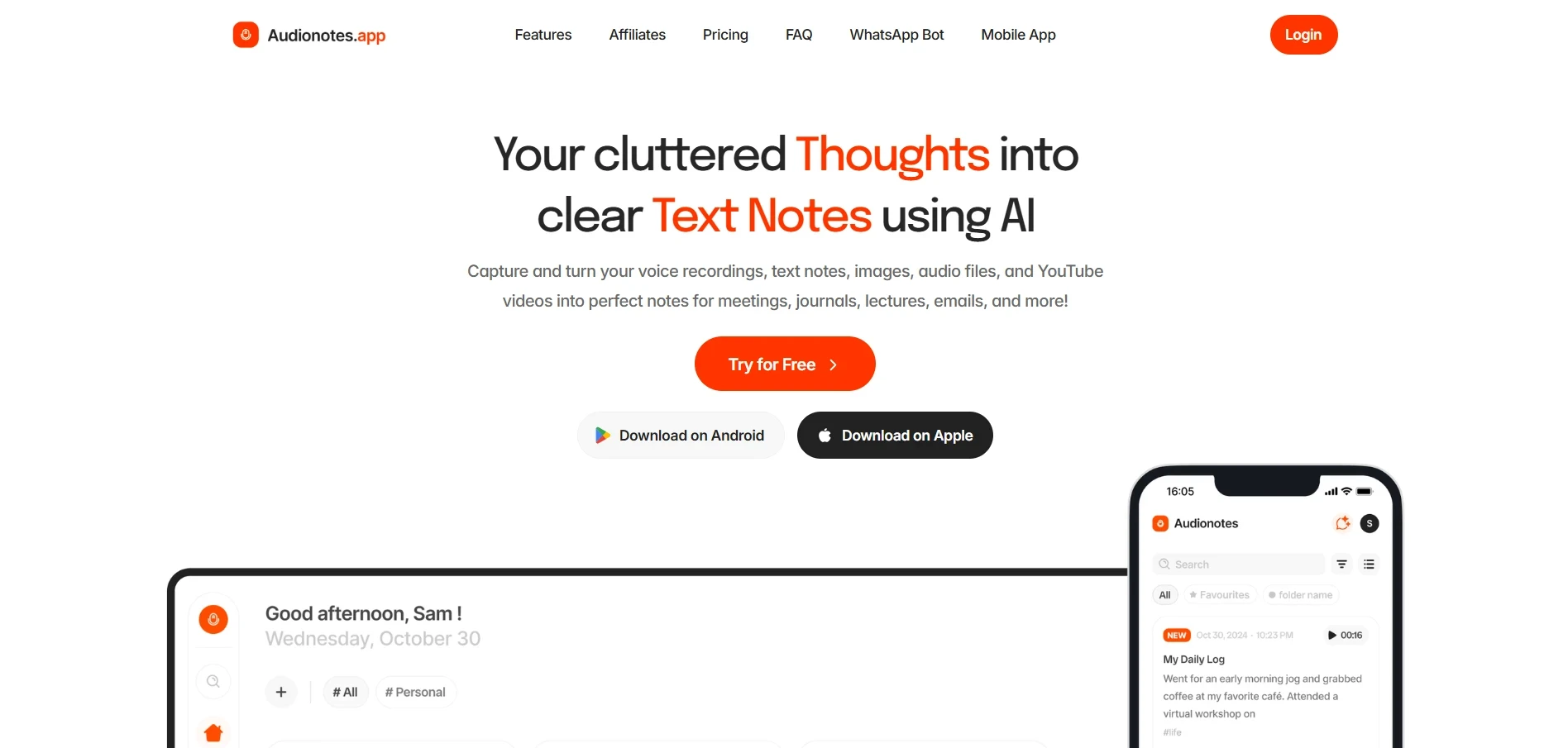
Audionotes is an AI-powered note-taking app that turns your voice into clear, structured notes within seconds. Instead of typing everything out, you can simply record or upload audio, and the app automatically generates summaries, transcripts, and even action points. It’s designed to save time while keeping notes organized and easy to share.
Key Features
AI transcription from audio to text
Smart summaries and bullet points
Organizes notes for quick reference
Export options for emails, documents, or shared files
Works for online and offline recordings
Best For
Students, professionals, or teams who want to record meetings, lectures, or ideas and instantly convert them into clean, usable notes.
Price
Free plan available with limited features
Personal Plan: $70/year
Pro Plan: $130/year
Microsoft OneNote (Website + Android App)
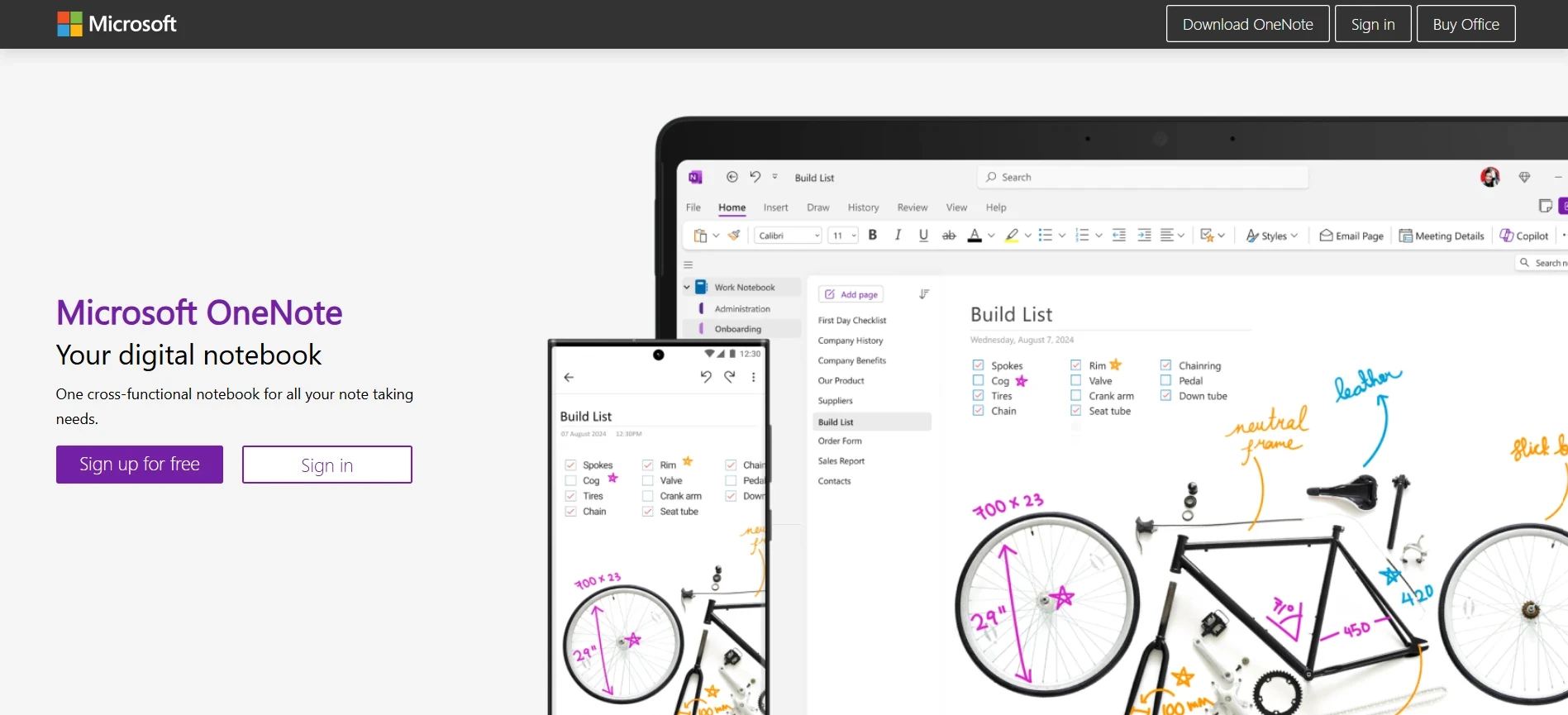
Microsoft OneNote is a free digital notebook that lets you capture notes in text, drawings, images, or even audio. It’s part of the Microsoft Office suite and syncs across devices, making it easy to access your notes anywhere. With its flexible structure, you can organize notes into notebooks, sections, and pages.
Key Features
Create notebooks, sections, and pages for easy organization
Supports text, images, drawings, and audio notes
Real-time collaboration with teams
Cloud sync with OneDrive for access across devices
Integrates with Microsoft Office apps
Best For
Users who need a feature-rich note-taking tool that integrates seamlessly with Microsoft Office and works well for both personal and professional use.
Price
Free with basic features
Additional storage and features available with a Microsoft 365 subscription
Google Keep (Website + Android App)
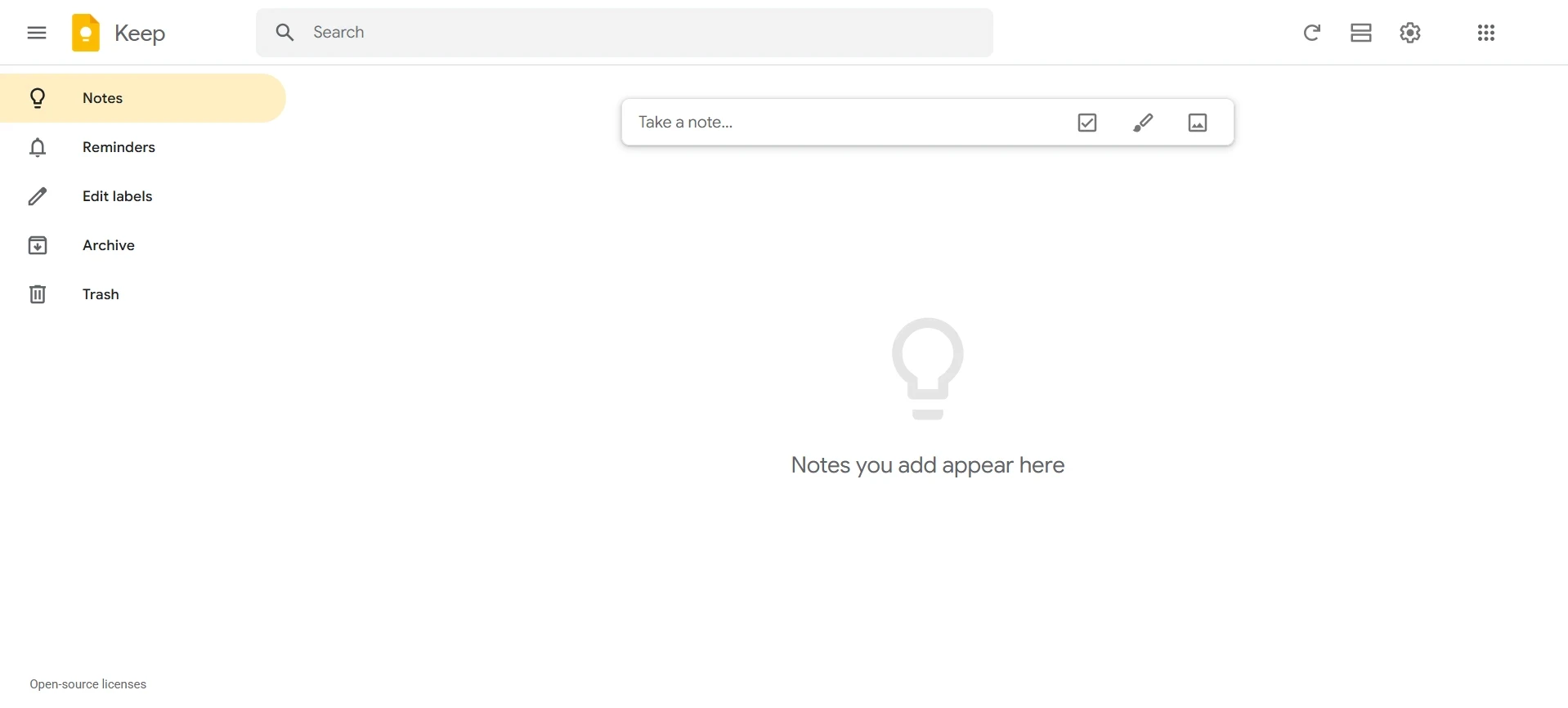
Google Keep is a lightweight, easy-to-use note-taking app designed for quick reminders, checklists, and simple notes. It syncs automatically with your Google account, so you can access your notes from any device. Its simple interface makes it perfect for capturing ideas on the go.
Key Features
Quick notes, to-do lists, and voice memos
Syncs with your Google account across all devices
Color-coded notes and labels for organization
Reminders with time or location triggers
Easy sharing and collaboration with others
Best For
Anyone who needs a simple, no-frills note-taking app that works seamlessly with Google services.
Price
Free to use (with storage tied to your Google account)
Notion (Website + Android App)
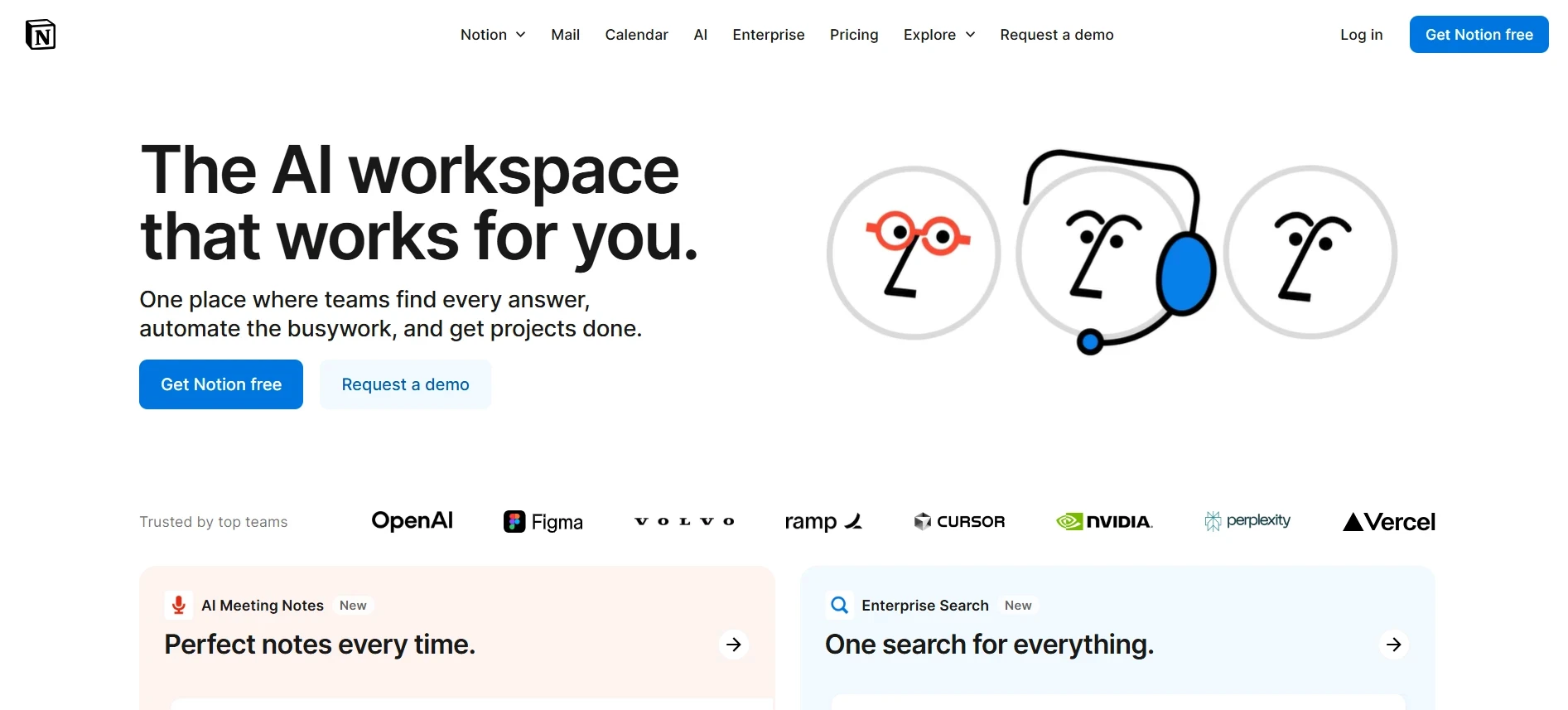
Notion is an all-in-one workspace that combines note-taking, project management, and collaboration. It allows you to create highly customizable pages, databases, and templates, making it a favorite for individuals and teams who want flexibility in organizing their work.
Key Features
Customizable pages, databases, and templates
Real-time collaboration and team workspaces
Integrations with popular apps like Slack, Google Drive, and more
Rich media support (text, images, video, code snippets)
Works offline and syncs across devices
Best For
Students, professionals, and teams who need more than just notes, ideal for managing projects, tasks, and knowledge bases in one place.
Price
Free plan available with core features
Plus Plan: $8/month
Business Plan: $15/month
Enterprise pricing available for larger teams
Obsidian (Website + Android App)
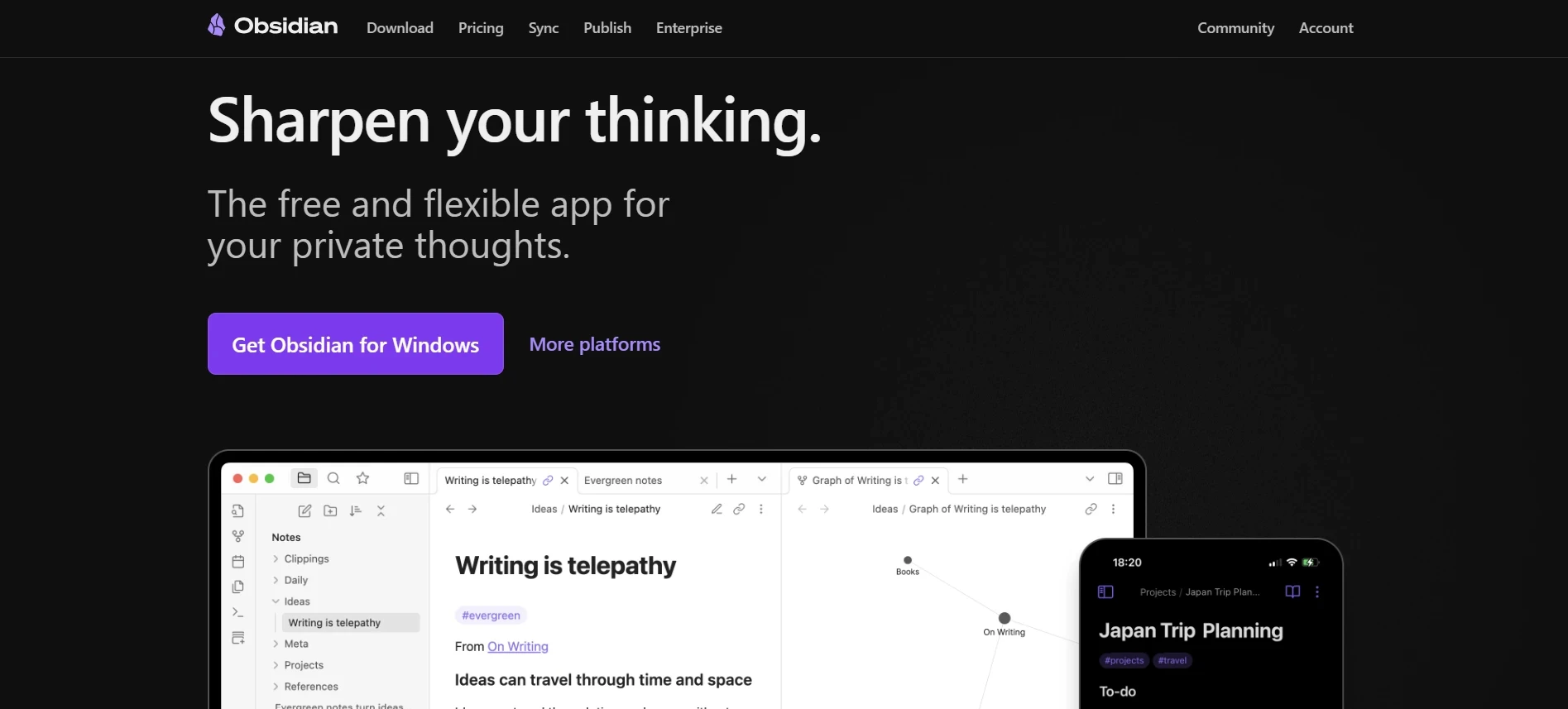
Obsidian is a powerful note-taking app built around markdown files, giving users full control of their notes on local storage. It’s designed for knowledge management and lets you connect ideas through backlinks, creating a “second brain” for deep thinkers, writers, and researchers.
Key Features
Markdown-based note-taking with local storage
Backlinks and graph view to connect ideas
Plugins and community add-ons for customization
Works offline and syncs with paid add-ons
Strong privacy since notes are stored on your device
Best For
Writers, researchers, and advanced users who want a highly customizable system for linking and organizing ideas.
Price
Free for personal use
Sync add-on: $4/month
Publish - $8/month
Catalyst- $25 one-time payment
Commercial license: $50/year
Optional publishing service available
Samsung Notes (Website + Android App)
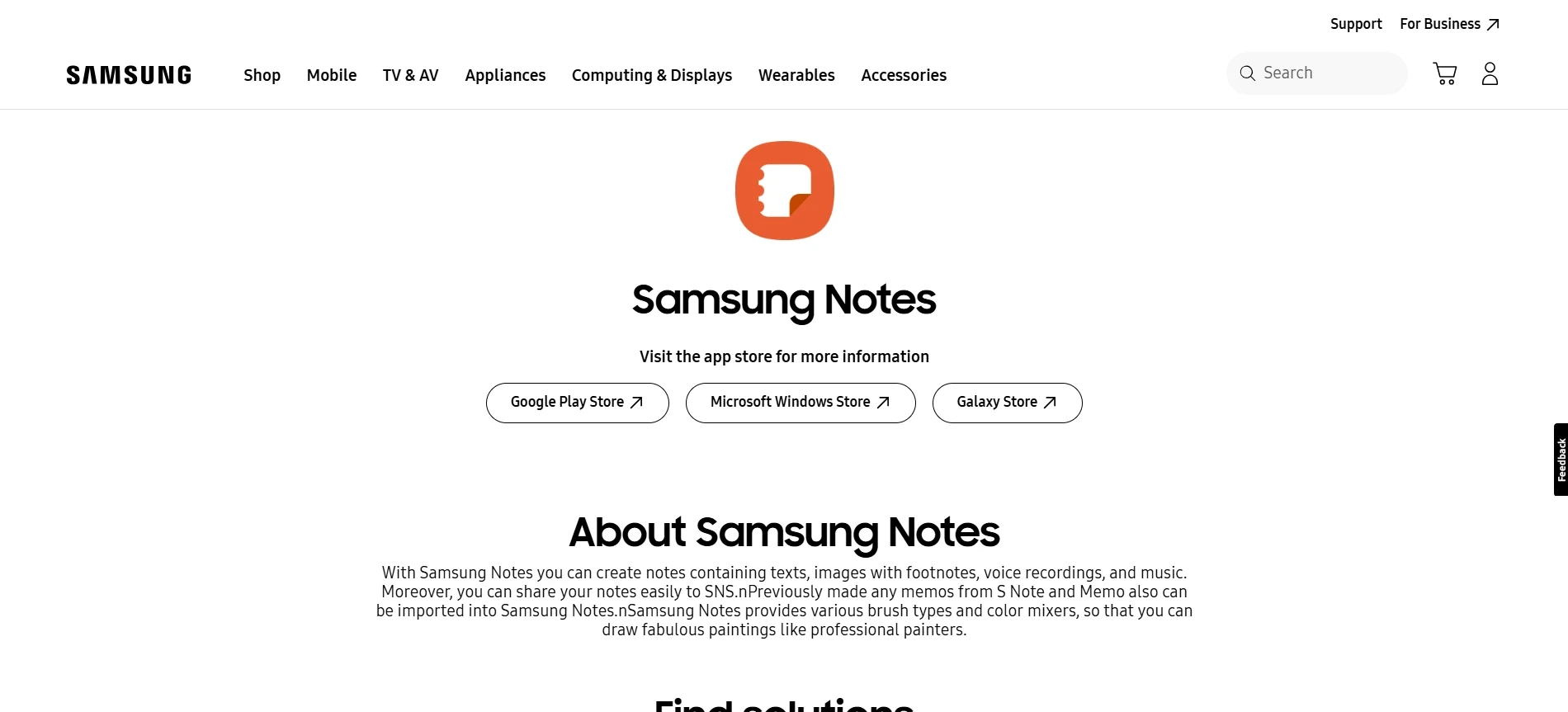
Samsung Notes is a versatile note-taking app available on Galaxy devices. It lets you type, handwrite, draw, add voice recordings, and annotate PDFs, all in one place. If you use an S Pen, your handwriting can even be converted into text and synced across devices.
Key Features
Type or handwrite notes, with handwriting-to-text conversion.
Write on PDFs, import documents, and annotate with ease.
Organize notes into folders and subfolders; use customizable page templates (grid, lined, to-do, etc.)
Annotate with the S Pen using tools like brushes, highlighters, and the lasso tool.
Add voice recordings synced to text, insert images, and lock notes for privacy.
New Galaxy AI features: Note Assist for summaries and formatting, plus Transcript Assist for transcribing voice recordings into your notes.
Best For
Galaxy users who want a flexible, media-rich note app, especially if you like handwriting or drawing with an S Pen and need smart AI-powered help.
Price
Free to use on Samsung devices; requires a Samsung account for syncing and AI features
Notesnook (Website + Android App)
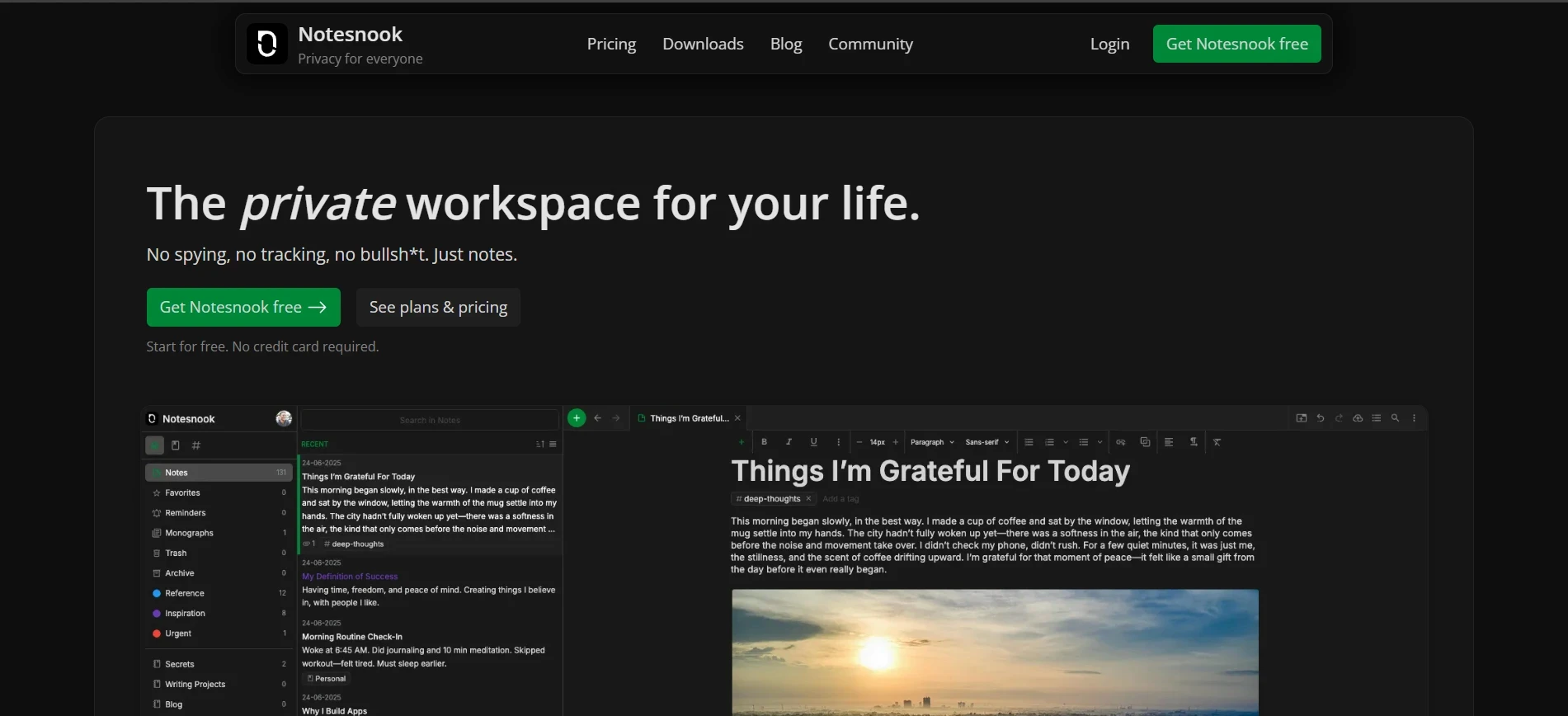
Notesnook is an open-source, privacy-first note-taking app. It encrypts your notes before they leave your device, so no one, including Notesnook, can read them. The app works across platforms and is designed to be simple, secure, and dependable.
Key Features
End-to-end encryption for all notes, at rest and in transit
Open-source (you can review or self-host the code)
Rich text editing with markdown support, tables, embeds, code blocks, and reminders
Secure, password-protected sharing ("Monographs") with optional self-destruct timing.
Cross-platform sync across unlimited devices, with app lock and 2FA for extra security
Best For
Anyone who values privacy above all else, especially students, teachers, and professionals who want powerful note features without giving up data security.
Price
Basic (free): Includes sync across devices, limited notebooks (up to 20), and basic exports.
Pro Plan ($4.49/month or 50/year): Unlocks unlimited notebooks/tags, attachments up to 500 MB, advanced web clipping, and exports to PDF, HTML, and Markdown. Educators can get it for $9.99/year.
Simplenote (Website + Android App)
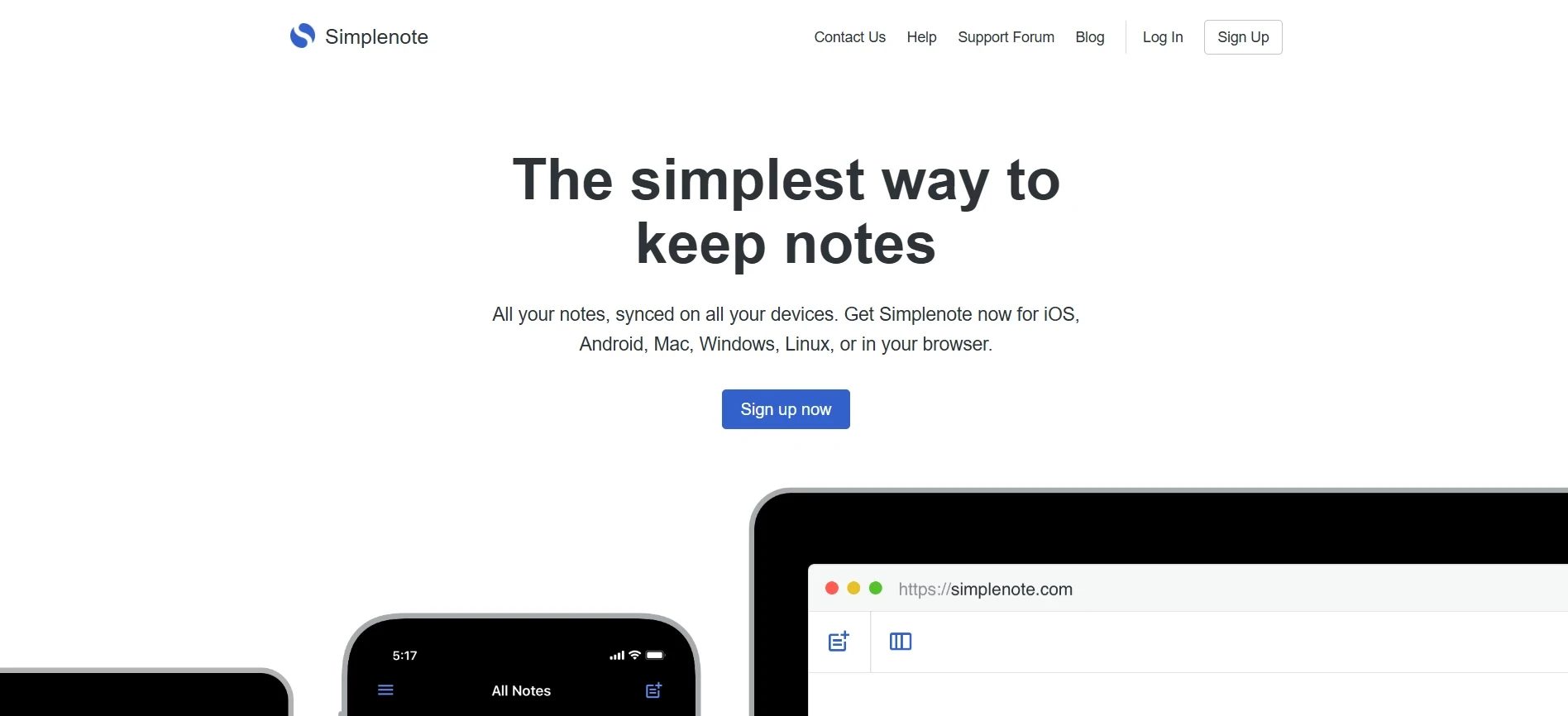
Simplenote is a clean and minimalist note-taking app that syncs across all your devices in real time. It’s built for speed and simplicity, perfect for jotting down ideas, making to-do lists, or capturing quick thoughts without distractions.
Key Features
Automatic, real-time sync across all your devices (no manual syncing needed)
Organize notes with tags, pins, and instant search
Markdown support for formatting notes
Revision history lets you go back in time to older versions of notes
Share or publish notes online with a link
Best For
Anyone who wants a fast, distraction-free note-taking app with seamless syncing and simple organization.
Price
Completely free. All features, including sync, backup, and sharing, are available at no cost.
What to Look for in an Android Note-Taking App?
With so many note-taking apps available, it’s important to choose the best app for taking notes on Android that actually makes your life easier. The best apps don’t just store your notes; they help you capture ideas quickly, keep them organized, and make them easy to find later. Here are the key things to look out for:
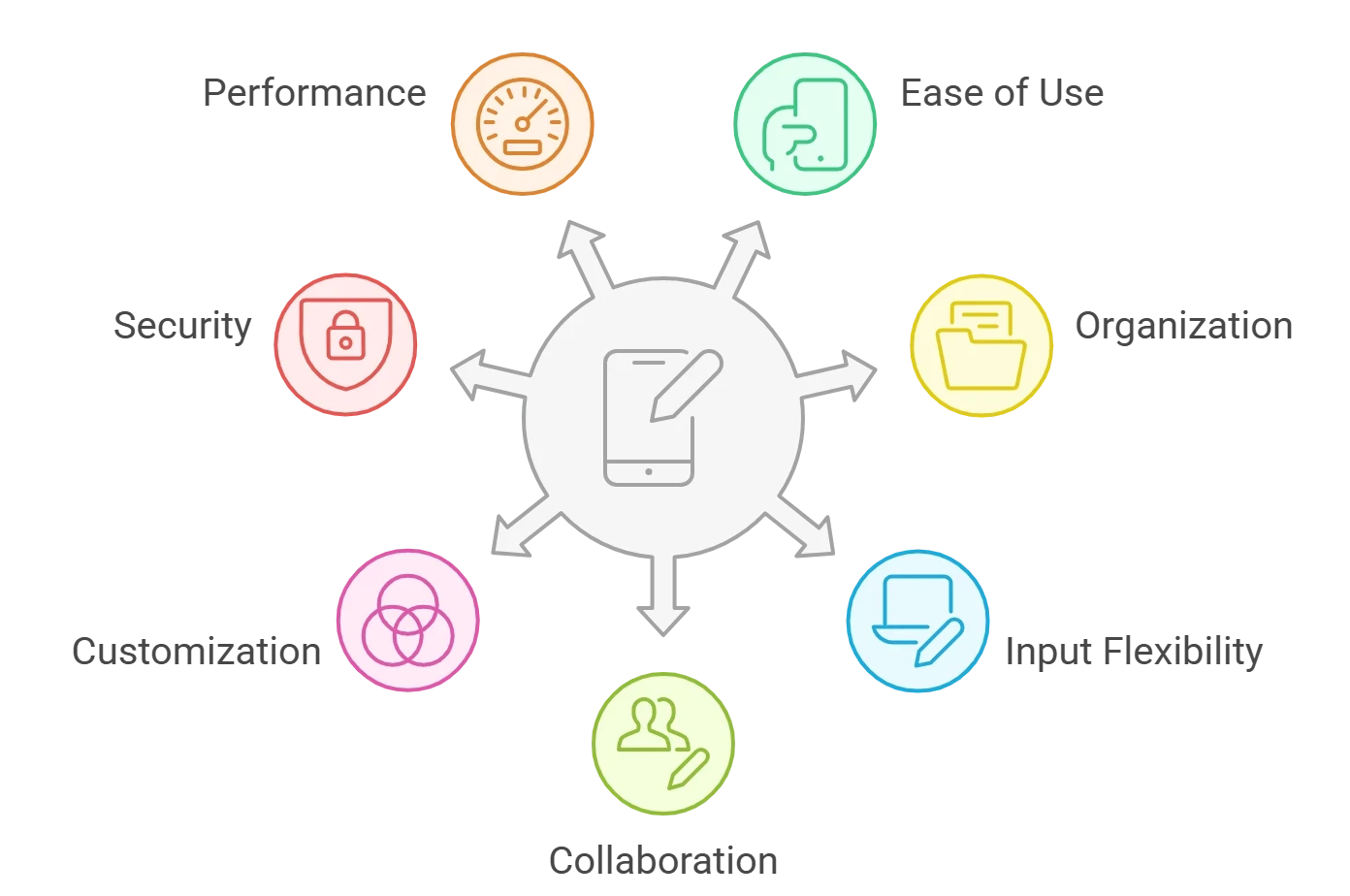
Ease of Use & Interface
A good note-taking app should have a clean, simple design so you can jot down thoughts without clicking through endless menus. It should also run smoothly, with minimal lag, even when switching between multiple notes or handling large documents.
Organization Features
As your notes grow, organization becomes key. Look for apps that offer folders, tags, and a strong search function so you can find what you need instantly. Sorting options, like by date, title, or priority, are useful too. Features like pinning or favoriting notes help keep important items at the top for quick access.
Input Flexibility
Everyone takes notes differently, so the best note-taking app for Android supports multiple input types, typed text, voice memos, handwriting, and images. Advanced features like OCR (optical character recognition) are especially handy because they let you pull text directly from photos or scanned documents. This is where AudioNotes really shines. Instead of just typing, you can record your voice, and the app automatically turns it into structured notes and summaries. This flexibility makes it perfect for capturing meetings, lectures, or brainstorming sessions when typing isn’t practical.
Collaboration & Sharing
If you work with others, collaboration is key. The best apps let multiple people edit the same note in real time, so everyone stays updated. They should also make it easy to share notes instantly—whether through a link, email, or messaging apps.
Customization
Note-taking is personal, so flexibility matters. Look for apps that let you adjust font sizes, switch between light and dark themes, and customize layouts. Some apps even provide reusable templates for recurring note types, like meeting notes or to-do lists.
Security
Notes often contain sensitive information, so security shouldn’t be overlooked. Features like password or biometric locks (fingerprint or face ID) protect your data from prying eyes. End-to-end encryption is even better, especially if you’re storing private or confidential notes.
Performance & Storage
A reliable note-taking app should handle large amounts of notes and files without slowing down. It also shouldn’t drain your phone’s battery too quickly. Efficient storage and smooth syncing ensure your notes are always ready when you need them.
How to Choose the Right Android Note-Taking App for You?
With so many options available, the best note-taking app for Android, which works for you, depends on your habits and needs. Asking yourself a few simple questions can help you figure out which app will fit your lifestyle and make note-taking more useful.
What Will I Use it for Most Often?
Think about your main purpose: Will you use it for quick reminders, detailed meeting minutes, journaling, brainstorming, or recording audio? If it’s just for quick lists, a lightweight app works best. If you need more detail, look for an app with advanced organization and powerful features.
How do I Prefer to Organize My Notes?
Some people like folders and categories, others prefer tags or keywords to search quickly, while others enjoy linking related notes together like a web. Choosing an app that matches your natural style will keep your notes easy to find and use.
Do I Need Access Across Multiple Devices?
If you move between your phone, tablet, and laptop, make sure the app syncs smoothly across all devices. Real-time sync is best for teams, while occasional manual sync may be fine for personal use.
You can check more note-taking apps for iPhone here.
What Kind of Input Methods do I Need?
Do you just type notes, or do you also want to handwrite, draw diagrams, record voice memos, or scan documents? If you handle different types of content, look for an app that supports multiple input formats without hassle.
Do I Need Offline Access?
If you often work in places with weak or no internet, check if the app allows offline editing and syncs automatically when you reconnect.
How Important is Security for my Notes?
If your notes include personal or sensitive info, choose an app with password protection, fingerprint/face unlock, or end-to-end encryption.
What Integrations Would Help my Workflow?
Some apps connect to calendars, task managers, or cloud storage, making them more powerful. Think about whether connecting notes to the rest of your productivity tools would make your life easier.
What’s my Budget?
Many note apps are free, but extras like unlimited storage, advanced collaboration, or AI-powered features may cost money. Decide if the premium features are worth it for your needs.
Conclusion
The best note-taking app for Android is the one that fits your needs and makes capturing ideas effortless. Whether you want something lightweight for quick reminders, a feature-rich tool for organizing projects, or an AI-powered app like AudioNotes that transcribes and summarizes your voice into clear notes, there’s an option for everyone. Take a moment to think about how you use notes in your daily life, and you’ll be able to choose the app that saves you time, keeps you organized, and helps you stay focused.
FAQs
What is the most important feature in a note-taking app?
The most important feature really depends on your needs. If you just want to jot things down quickly, an easy-to-use interface and fast access are key. If you’re working on bigger projects, you might need advanced organization tools or cloud syncing. For others, voice-to-text features can make a big difference. Focus on the features that actually support how you take notes every day.
How can I make my notes more organized in a digital app?
Start by using tags, folders, or colors to sort your notes into categories. This makes it easier to find what you’re looking for later. Make it a habit to clean up and delete old notes you don’t need anymore. If your app allows, link related notes together; this helps connect ideas and keeps everything more searchable.
What input methods should I look for in the Best Digital Note-Taking App for Android?
Think about how you naturally take notes. Do you prefer typing, handwriting, drawing, voice recording, or scanning documents? The best app for you will support multiple input styles so you’re not limited. For example, Audionotes makes this super easy by turning your voice recordings into clean, structured notes automatically.
How do I test if a note-taking app is right for me?
The best way is to try it out for at least a week. Notice how quickly you can create notes, how easy it is to organize them, and how comfortable the app feels to use. If it fits into your daily routine without slowing you down, it’s probably the right choice.

